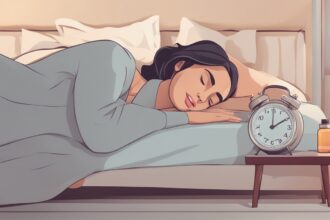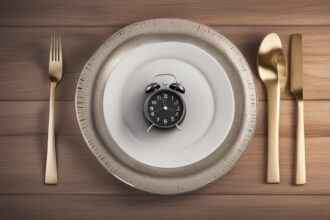Have you ever wondered how sleep and fasting are connected? If you’re someone who practices intermittent fasting or other fasting methods for health, weight loss, or mental clarity, you might have noticed changes in your sleep patterns. Maybe you’re struggling to fall asleep during a fast, or perhaps you’ve experienced deeper, more restful nights after breaking one. In this post, we’re diving deep into the fascinating relationship between fasting and sleep, exploring the science behind it, and sharing practical tips to help you optimize both for better overall wellness. Whether you’re a seasoned faster or just curious about how these two pillars of health intersect, let’s uncover the secrets to balancing fasting and rest.
The Science Behind Sleep and Fasting
At first glance, sleep and fasting might seem unrelated, but they’re deeply intertwined at a biological level. Fasting, which involves abstaining from food for a set period, triggers a cascade of hormonal and metabolic changes in the body. These changes can directly influence your sleep quality. For instance, during a fast, your body shifts into a state of ketosis, where it burns fat for energy instead of glucose. This metabolic shift can impact the production of melatonin, the hormone responsible for regulating your sleep-wake cycle. Studies suggest that fasting may also reduce inflammation and oxidative stress, both of which can contribute to better sleep during fasting by calming the nervous system.
On the flip side, poor sleep can disrupt the benefits of fasting. Lack of rest increases stress hormones like cortisol, which can spike hunger hormones such as ghrelin, making it harder to stick to your fasting schedule. Understanding this bidirectional relationship between fasting and sleep quality is key to maximizing the health benefits of both practices.
How Fasting Affects Your Sleep Patterns
Many people report changes in their sleep when they start fasting, especially with methods like intermittent fasting (16:8 or 5:2 plans). Some experience improved sleep due to reduced late-night eating, which can prevent digestive discomfort and acid reflux—common culprits of nighttime restlessness. However, others might struggle with falling asleep during fasting windows, especially if hunger pangs kick in or if they’re fasting late into the evening. This is often tied to low blood sugar levels or dehydration, both of which can signal the brain to stay alert rather than wind down for restful sleep while fasting.
Interestingly, fasting can also influence the stages of sleep. Research indicates that prolonged fasting or calorie restriction may increase slow-wave sleep, the deep, restorative phase of your sleep cycle. This could explain why some fasters wake up feeling more refreshed after adapting to their routine. However, the initial adjustment period might come with lighter, fragmented sleep as your body recalibrates.
The Impact of Sleep on Fasting Success
Just as fasting impacts sleep, the quality of your rest plays a huge role in how effectively you can maintain a fasting lifestyle. When you’re sleep-deprived, your body craves quick energy sources—think sugary snacks or carbs—which can derail your fasting and sleep balance. Poor sleep also messes with insulin sensitivity, a key factor in how your body handles fasting and fat-burning. If you’re not getting enough shut-eye, you might find yourself battling intense cravings or low energy during fasting windows.
Moreover, sleep is when your body does most of its repair and recovery work. Fasting already puts a mild stress on the system as it adapts to using stored energy, so pairing it with inadequate rest can leave you feeling drained rather than revitalized. Prioritizing sleep for fasting success isn’t just a nice-to-have—it’s a must for long-term adherence and results.
Tips to Improve Sleep While Fasting
If you’ve noticed that fasting is throwing off your sleep, don’t worry—there are plenty of ways to get back on track. Adjusting your fasting schedule and bedtime routine can make a world of difference in achieving better sleep with fasting. Here are some actionable strategies to try:
- Time Your Eating Window: If possible, avoid eating too close to bedtime. Finish your last meal at least 2–3 hours before you plan to sleep to give your body time to digest and prevent discomfort.
- Stay Hydrated: Dehydration during fasting can disrupt sleep. Sip water throughout the day, and consider adding a pinch of salt to replenish electrolytes if you’re on a longer fast.
- Limit Caffeine Late in the Day: Fasting can sometimes heighten sensitivity to stimulants. Avoid coffee or tea in the late afternoon or evening to ensure they don’t interfere with your rest.
- Create a Relaxing Bedtime Routine: Wind down with calming activities like reading or meditation to signal to your brain that it’s time to sleep, especially if hunger is keeping you awake.
Strategies to Support Fasting with Better Sleep
Optimizing your sleep doesn’t just help you feel better—it can supercharge your fasting results. When you’re well-rested, you’re more likely to stick to your fasting goals and resist temptations. Let’s explore some ways to prioritize rest for a smoother fasting and sleep synergy:
- Set a Consistent Sleep Schedule: Go to bed and wake up at the same time every day to regulate your body’s internal clock, which can help stabilize hunger hormones during fasting.
- Optimize Your Sleep Environment: Keep your bedroom dark, quiet, and cool to promote deeper sleep, which supports recovery during fasting periods.
- Avoid Screens Before Bed: Blue light from phones or laptops can suppress melatonin production, making it harder to fall asleep while fasting.
- Consider Short Naps: If fasting leaves you fatigued, a 20–30 minute nap during the day can recharge you without disrupting nighttime sleep.
- Practice Stress Management: High stress can worsen both sleep and fasting outcomes. Try deep breathing or yoga to calm your mind and body.
Common Challenges and How to Overcome Them
Balancing sleep and fasting isn’t always smooth sailing. One common issue is hunger-induced insomnia, especially during the first few days of a new fasting routine. To combat this, try sipping herbal tea (like chamomile) or warm water during your fasting window to soothe your stomach and mind. Another challenge is feeling overly alert at night due to fasting’s effect on adrenaline and cortisol levels. If this happens, experiment with shorter fasting windows or shift your eating period earlier in the day to align with your natural circadian rhythm.
Lastly, some fasters report vivid dreams or waking up frequently. This could be tied to metabolic shifts or even nutrient imbalances if fasting isn’t paired with a balanced diet. Ensure you’re getting enough magnesium and B vitamins during eating windows, as deficiencies can disrupt sleep patterns during fasting. If problems persist, consult a healthcare provider to rule out underlying issues.
In wrapping up, the relationship between sleep and fasting is a powerful one that can either make or break your health journey. When done right, fasting can enhance sleep quality by regulating hormones and reducing digestive stress, while good sleep supports fasting by curbing cravings and boosting energy. The key is to listen to your body, experiment with timing, and prioritize rest just as much as you prioritize your fasting schedule. By implementing the tips we’ve discussed—like staying hydrated, timing meals wisely, and creating a sleep-friendly environment—you can achieve a harmonious balance of fasting and better sleep. So, why not start tonight? Make a small tweak to your routine, and see how it transforms your energy, focus, and overall well-being. Here’s to healthier days and restful nights!






